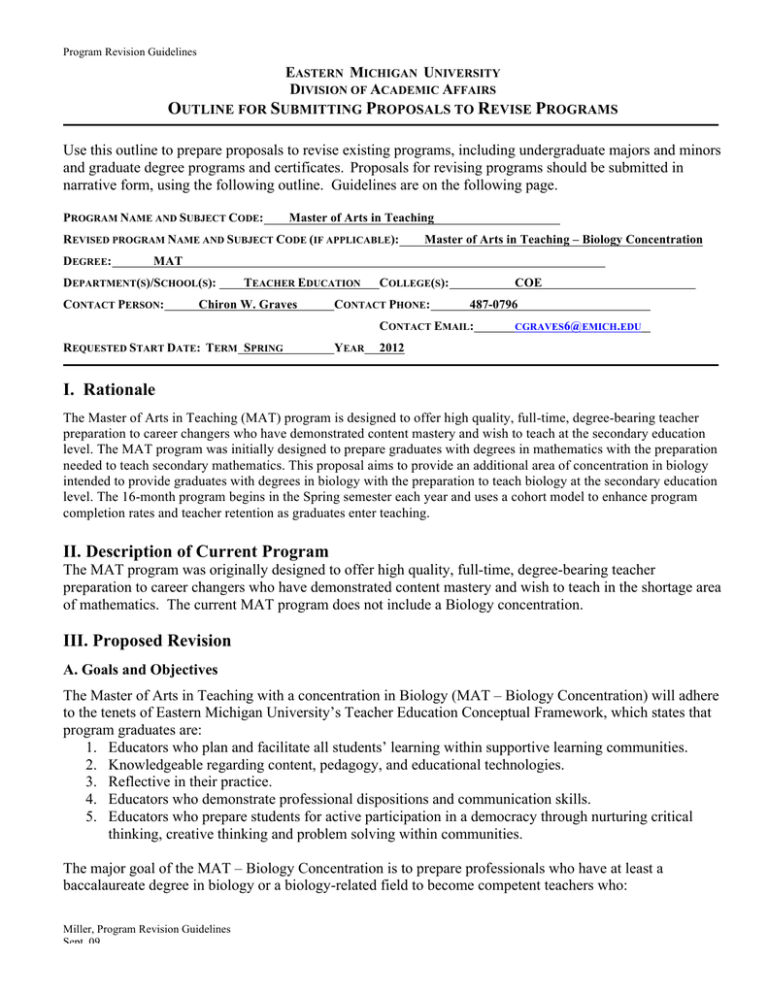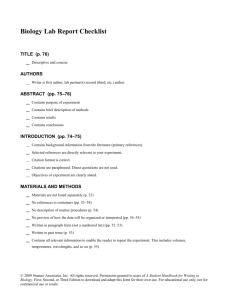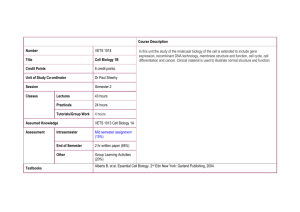O S P
advertisement

Program Revision Guidelines EASTERN MICHIGAN UNIVERSITY DIVISION OF ACADEMIC AFFAIRS OUTLINE FOR SUBMITTING PROPOSALS TO REVISE PROGRAMS Use this outline to prepare proposals to revise existing programs, including undergraduate majors and minors and graduate degree programs and certificates. Proposals for revising programs should be submitted in narrative form, using the following outline. Guidelines are on the following page. PROGRAM NAME AND SUBJECT CODE: Master of Arts in Teaching REVISED PROGRAM NAME AND SUBJECT CODE (IF APPLICABLE): DEGREE: Master of Arts in Teaching – Biology Concentration MAT DEPARTMENT(S)/SCHOOL(S): CONTACT PERSON: TEACHER EDUCATION Chiron W. Graves COLLEGE(S): CONTACT PHONE: COE 487-0796 CONTACT EMAIL: REQUESTED START DATE: TERM SPRING YEAR CGRAVES6@EMICH.EDU 2012 I. Rationale The Master of Arts in Teaching (MAT) program is designed to offer high quality, full-time, degree-bearing teacher preparation to career changers who have demonstrated content mastery and wish to teach at the secondary education level. The MAT program was initially designed to prepare graduates with degrees in mathematics with the preparation needed to teach secondary mathematics. This proposal aims to provide an additional area of concentration in biology intended to provide graduates with degrees in biology with the preparation to teach biology at the secondary education level. The 16-month program begins in the Spring semester each year and uses a cohort model to enhance program completion rates and teacher retention as graduates enter teaching. II. Description of Current Program The MAT program was originally designed to offer high quality, full-time, degree-bearing teacher preparation to career changers who have demonstrated content mastery and wish to teach in the shortage area of mathematics. The current MAT program does not include a Biology concentration. III. Proposed Revision A. Goals and Objectives The Master of Arts in Teaching with a concentration in Biology (MAT – Biology Concentration) will adhere to the tenets of Eastern Michigan University’s Teacher Education Conceptual Framework, which states that program graduates are: 1. Educators who plan and facilitate all students’ learning within supportive learning communities. 2. Knowledgeable regarding content, pedagogy, and educational technologies. 3. Reflective in their practice. 4. Educators who demonstrate professional dispositions and communication skills. 5. Educators who prepare students for active participation in a democracy through nurturing critical thinking, creative thinking and problem solving within communities. The major goal of the MAT – Biology Concentration is to prepare professionals who have at least a baccalaureate degree in biology or a biology-related field to become competent teachers who: Miller, Program Revision Guidelines Sept. 09 Program Revision Guidelines • • • • • • Receive a Michigan Provisional Teaching License upon completion of the program, receiving passing scores on the MTTC Mathematics exam and meeting all Michigan state certification requirements (such as free from civil or criminal issues; CPR & First Aid). Demonstrate a mastery of the knowledge of theory and practice necessary to apply Michigan’s Biology High School Course Expectations (Biology HSCEs) to the student and classroom. Reflect on teaching practices. Analyze cross-cultural educational issues. Demonstrate effective teaching methods and best practices that address the diverse needs of students. Demonstrate an awareness, understanding, and ability to implement the latest reforms in biology education. Student Learning Outcomes (SLOs): Teacher candidates who complete the MAT–Biology Concentration will: • Develop an enhanced knowledge base of educational strategies, curriculum development, and instructional management skills needed in secondary schools. • Acquire knowledge about the growth and development of adolescents and how they learn. • Evaluate biology content knowledge and develop critical thinking skills and creative inquiry processes. • Evaluate instructional strategies and develop teaching units that will improve learning within the classroom that encourage students’ development of critical thinking, problem solving, and performance skills. • Use appropriate techniques for integrating curriculum, instructional, and assessment methods. • Use professional materials, organizations, and current research to expand their knowledge about innovations, issues and trends in biology education to improve instruction. • Use inclusive approaches to teaching, learning and assessment, to increase students’ biological knowledge and skills. • Systematically reflect on their practice and learn from experience. • Develop leadership skills to enhance instruction in the classroom and to communicate with parents, administrators, and school community. • Promote cooperative exchanges within the classroom, among faculty, and with parents to provide greater opportunities in the curriculum and instruction in the classroom. • Demonstrate integrity and professional ethics. B. Program The MAT – Biology Concentration is a full time, 38 credit hour program, which leads to initial teaching certification in high school biology and an endorsement to science in grades 6-8. The program is designed for qualified students to begin in the spring semester and finish at the end of the following summer semester. The program is intended for students with a BA or BS in biology or a biology-related field who wish to earn a State of Michigan teacher certificate. Biology Content Courses (9 credits) BIOT 503 Secondary Methods for Biology Teachers (3) (the Request for New Course form is attached) BIO 508 Historical Analysis of Biological Investigations (3) (the Request for New Course form is attached) BIO or BIOT elective (3) Professional Studies in Education (29 credits) EDPS 501 Psychology of Adolescence (2) CURR 505 Curriculum and Methods: Secondary (3) CURR/SOFD654 Multicultural Teaching and Learning (3) Miller, Program Revision Guidelines Sept. 09 Program Revision Guidelines SPGN 510 Students with Disabilities in the General Education Classroom (3) EDPS 627 Designing Classroom Assessments (3) RDNG 657 Comprehension and the Content Areas (3) PHY 520 Teaching of Physical Science (3) EDMT 602 Technology and Student-Centered Learning (3) EDUC 592 Teaching Internship: Secondary (6) C. Assessment Student achievement will be closely monitored through LiveText assessments and the National Council for Accreditation of Teacher Education (NCATE) program review. Student grades, field placement and internship evaluations will be reviewed by faculty and the Office of Academic Services. In addition to scholastic achievement, measured by course grades and cumulative GPA, students will be observed and assessed by cooperating teachers and university supervisors for their ability to apply what they have learned in practice. Student employment after certification will be monitored as an additional aspect of program evaluation. D. Admissions The following are qualifications for admission as outlined in the MAT – Biology Concentration: • An undergraduate degree in biology or biology-related field from an accredited college or university. • A minimum of 28 semester hours in biology course work is required and must include the following: o Genetics o Physiology o Botany o Zoology • 2 semesters of Introductory Chemistry • 1 semester of Organic Chemistry • 1 semester of Biochemistry (or a 2nd semester of Organic Chemistry) • 2 semesters of Introductory Physics • 1 semester of Calculus or Statistics • Minimum grade point average of 2.75 in the last half of the undergraduate work. • Two letters of recommendation, including one from a college professor. • Pass on all sections of the MTTC Basic Skills Test. • Attendance of a M.A.T. orientation meeting and completion of an on-demand writing assessment. • Signed statement regarding Civil/Criminal conviction(s) E. Resources: • Faculty: Because the proposed MAT – Biology Concentration is intended to provide an additional area of concentration for students seeking a Master of Arts in Teaching degree, many of the courses in this program already exist and will be taught by faculty from the College of Education and the College of Arts and Sciences. There are two new courses that are being proposed for the MAT – Biology Program. Both of these courses will be taught by Chiron W. Graves, Assistant Professor of Biology. • Library Resources: The library already has the resources necessary for biology education preparation programs as an undergraduate program for teacher certification in biology already exists. •Facilities: As with the library resources, the current university facilities meet the program’s needs. IV. Impact Miller, Program Revision Guidelines Sept. 09 Program Revision Guidelines The MAT- Biology concentration will enhance the educational and career opportunities available to students who already have a degree and are interested in switching to a career in education. V. Budget No new faculty are required for this concentration to be successful. With 38 credits required to complete this MAT-Biology Concentration, the concentration will be revenue positive generating $19,864 per student (38 credits x $518/credit). VI. Action of the Department/College 1. Department/School: Vote of faculty: For 14 Against 0 (Enter the number of votes cast in each category.) I support this proposal. The proposed revision can without additional College or University resources. Abstentions 1 be implemented within the affected Department(s)/School(s) Department Head/School Director Signature Date 2. College/Graduate School: A. College I support this proposal. The proposed program can College without additional University resources. cannot College Dean Signature be implemented within the affected Date B. Graduate School (Graduate Program Revisions ONLY) Graduate Dean Signature Date VII. Approval Associate Vice-President for Academic Programming Signature Date VIII. Appendices A. Market Analysis/Needs Assessment B. Mandates C. Request for New/Revised Course Forms D. Letters of Support from Impacted Departments E. Cost Analysis (Complete only if the revision cannot be implemented without additional University resources. Fill in Estimated Resources for the sponsoring department(s). Attach separate estimates for other affected departments.) Miller, Program Revision Guidelines Sept. 09




